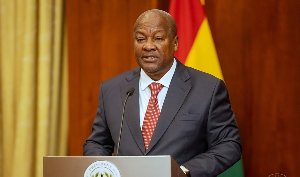The Monetary Policy Committee (MPC) on Wednesday raised its benchmark policy rate by 50 basis points to 15 per cent from 14.5 per cent citing “upside risks to inflation.”
“On the assessment of the risks in the economy, the Committee was of the view that risks to the inflation outlook were on the upside. These were underscored by exchange rate depreciation, domestic financing of the fiscal deficit and energy subsidies,” Mr. Kwesi Amissah-Arthur, Governor of the Bank of Ghana told journalists at a press conference in Accra.
“Given these considerations, the MPC noted that the upside risks to inflation outweigh the downside risks to growth and has therefore decided to increase the policy rate from 14.5 per cent to 15 per cent,” he added.
Mr. Amissah-Arthur said the exchange rate pressure and the threat it posed to macro-economic stability was the dominant issue of discussions at the MPC meeting.
He said the Bank had implemented a number of measures to mop up excess liquidity in the system contributing to stabilising the exchange rate.
The policy measures included a review of the currency composition of reserve requirements of banks, re-introduction of BoG instruments, the maintenance of banks’ Vostro balances in the Central Bank, and stepped-up sterilisation efforts.
“The Committee notes that the measures have begun to take effect.
Increases in the policy rate have led to upward adjustments in rates of money market instruments and improved the attractiveness of cedi assets compared to foreign currency assets,” Mr. Amissah-Arthur said.
However, he said the MPC noted some weakening of the indices of business and consumer confidence, with the composite index of economic activity expanding at a slower pace.
Private sector credit increased moderately and the banking industry remained stable, sound and profitable.
On the external sector, exports receipts increased, however developments in the global economy with regards to the Euro zone and weak global growth prospects may have a dampening effect on commodity prices and can lead to further balance of payments challenges.
Mr. Amissah-Arthur said the fiscal performance showed that risks to the fiscal outlook have intensified.
On the revenue side, tax revenues improved but the tax effort remained weak compared to the size and level of sophistication of the economy.
“The underlying pressures in Government expenditures were linked to outstanding payments, large and growing energy subsidies, higher than budgeted spending on wages and related expenses and rising interest costs,” he said.
Mr. Amissah-Arthur said the weakening of both business and consumer confidence and tightening of credit stance on households and enterprises could pose downside risks to the growth outlook.**
Business News of Wednesday, 13 June 2012
Source: GNA













